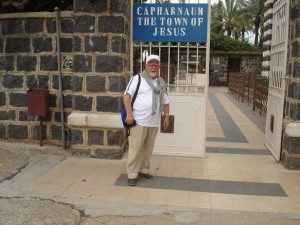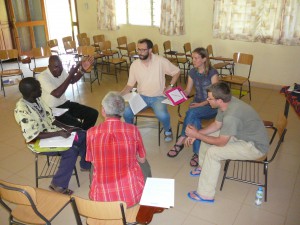MESSAGE
OF HIS HOLINESS POPE FRANCIS
FOR LENT 2015
“Make your hearts firm” (Jas 5:8)
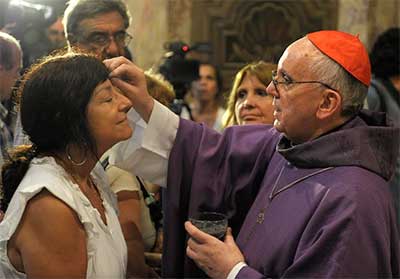 Dear Brothers and Sisters,
Dear Brothers and Sisters,
Lent is a time of renewal for the whole Church, for each communities and every believer. Above all it is a “time of grace” (2 Cor 6:2). God does not ask of us anything that he himself has not first given us. “We love because he first has loved us” (1 Jn 4:19). He is not aloof from us. Each one of us has a place in his heart. He knows us by name, he cares for us and he seeks us out whenever we turn away from him. He is interested in each of us; his love does not allow him to be indifferent to what happens to us. Usually, when we are healthy and comfortable, we forget about others (something God the Father never does): we are unconcerned with their problems, their sufferings and the injustices they endure… Our heart grows cold. As long as I am relatively healthy and comfortable, I don’t think about those less well off. Today, this selfish attitude of indifference has taken on global proportions, to the extent that we can speak of a globalization of indifference. It is a problem which we, as Christians, need to confront.
When the people of God are converted to his love, they find answers to the questions that history continually raises. One of the most urgent challenges which I would like to address in this Message is precisely the globalization of indifference.
Indifference to our neighbour and to God also represents a real temptation for us Christians. Each year during Lent we need to hear once more the voice of the prophets who cry out and trouble our conscience.
God is not indifferent to our world; he so loves it that he gave his Son for our salvation. In the Incarnation, in the earthly life, death, and resurrection of the Son of God, the gate between God and man, between heaven and earth, opens once for all. The Church is like the hand holding open this gate, thanks to her proclamation of God’s word, her celebration of the sacraments and her witness of the faith which works through love (cf. Gal 5:6). But the world tends to withdraw into itself and shut that door through which God comes into the world and the world comes to him. Hence the hand, which is the Church, must never be surprised if it is rejected, crushed and wounded.
God’s people, then, need this interior renewal, lest we become indifferent and withdraw into ourselves. To further this renewal, I would like to propose for our reflection three biblical texts.
1. “If one member suffers, all suffer together” (1 Cor 12:26) – The Church
The love of God breaks through that fatal withdrawal into ourselves which is indifference. The Church offers us this love of God by her teaching and especially by her witness. But we can only bear witness to what we ourselves have experienced. Christians are those who let God clothe them with goodness and mercy, with Christ, so as to become, like Christ, servants of God and others. This is clearly seen in the liturgy of Holy Thursday, with its rite of the washing of feet. Peter did not want Jesus to wash his feet, but he came to realize that Jesus does not wish to be just an example of how we should wash one another’s feet. Only those who have first allowed Jesus to wash their own feet can then offer this service to others. Only they have “a part” with him (Jn 13:8) and thus can serve others.
Lent is a favourable time for letting Christ serve us so that we in turn may become more like him. This happens whenever we hear the word of God and receive the sacraments, especially the Eucharist. There we become what we receive: the Body of Christ. In this body there is no room for the indifference which so often seems to possess our hearts. For whoever is of Christ, belongs to one body, and in him we cannot be indifferent to one another. “If one part suffers, all the parts suffer with it; if one part is honoured, all the parts share its joy” (1 Cor 12:26).
The Church is the communio sanctorum not only because of her saints, but also because she is a communion in holy things: the love of God revealed to us in Christ and all his gifts. Among these gifts there is also the response of those who let themselves be touched by this love. In this communion of saints, in this sharing in holy things, no one possesses anything alone, but shares everything with others. And since we are united in God, we can do something for those who are far distant, those whom we could never reach on our own, because with them and for them, we ask God that all of us may be open to his plan of salvation.
2. “Where is your brother?” (Gen 4:9) – Parishes and Communities
All that we have been saying about the universal Church must now be applied to the life of our parishes and communities. Do these ecclesial structures enable us to experience being part of one body? A body which receives and shares what God wishes to give? A body which acknowledges and cares for its weakest, poorest and most insignificant members? Or do we take refuge in a universal love that would embrace the whole world, while failing to see the Lazarus sitting before our closed doors (Lk 16:19-31)?
In order to receive what God gives us and to make it bear abundant fruit, we need to press beyond the boundaries of the visible Church in two ways.
In the first place, by uniting ourselves in prayer with the Church in heaven. The prayers of the Church on earth establish a communion of mutual service and goodness which reaches up into the sight of God. Together with the saints who have found their fulfilment in God, we form part of that communion in which indifference is conquered by love. The Church in heaven is not triumphant because she has turned her back on the sufferings of the world and rejoices in splendid isolation. Rather, the saints already joyfully contemplate the fact that, through Jesus’ death and resurrection, they have triumphed once and for all over indifference, hardness of heart and hatred. Until this victory of love penetrates the whole world, the saints continue to accompany us on our pilgrim way. Saint Therese of Lisieux, a Doctor of the Church, expressed her conviction that the joy in heaven for the victory of crucified love remains incomplete as long as there is still a single man or woman on earth who suffers and cries out in pain: “I trust fully that I shall not remain idle in heaven; my desire is to continue to work for the Church and for souls” (Letter 254, July 14, 1897).
We share in the merits and joy of the saints, even as they share in our struggles and our longing for peace and reconciliation. Their joy in the victory of the Risen Christ gives us strength as we strive to overcome our indifference and hardness of heart.
In the second place, every Christian community is called to go out of itself and to be engaged in the life of the greater society of which it is a part, especially with the poor and those who are far away. The Church is missionary by her very nature; she is not self-enclosed but sent out to every nation and people.
Her mission is to bear patient witness to the One who desires to draw all creation and every man and woman to the Father. Her mission is to bring to all a love which cannot remain silent. The Church follows Jesus Christ along the paths that lead to every man and woman, to the very ends of the earth (cf. Acts 1:8). In each of our neighbours, then, we must see a brother or sister for whom Christ died and rose again. What we ourselves have received, we have received for them as well. Similarly, all that our brothers and sisters possess is a gift for the Church and for all humanity.
Dear brothers and sisters, how greatly I desire that all those places where the Church is present, especially our parishes and our communities, may become islands of mercy in the midst of the sea of indifference!
3. “Make your hearts firm!” (James 5:8) – Individual Christians
As individuals too, we have are tempted by indifference. Flooded with news reports and troubling images of human suffering, we often feel our complete inability to help. What can we do to avoid being caught up in this spiral of distress and powerlessness?
First, we can pray in communion with the Church on earth and in heaven. Let us not underestimate the power of so many voices united in prayer! The 24 Hours for the Lord initiative, which I hope will be observed on 13-14 March throughout the Church, also at the diocesan level, is meant to be a sign of this need for prayer.
Second, we can help by acts of charity, reaching out to both those near and far through the Church’s many charitable organizations. Lent is a favourable time for showing this concern for others by small yet concrete signs of our belonging to the one human family.
Third, the suffering of others is a call to conversion, since their need reminds me of the uncertainty of my own life and my dependence on God and my brothers and sisters. If we humbly implore God’s grace and accept our own limitations, we will trust in the infinite possibilities which God’s love holds out to us. We will also be able to resist the diabolical temptation of thinking that by our own efforts we can save the world and ourselves.
As a way of overcoming indifference and our pretensions to self-sufficiency, I would invite everyone to live this Lent as an opportunity for engaging in what Benedict XVI called a formation of the heart (cf. Deus Caritas Est, 31). A merciful heart does not mean a weak heart. Anyone who wishes to be merciful must have a strong and steadfast heart, closed to the tempter but open to God. A heart which lets itself be pierced by the Spirit so as to bring love along the roads that lead to our brothers and sisters. And, ultimately, a poor heart, one which realizes its own poverty and gives itself freely for others.
During this Lent, then, brothers and sisters, let us all ask the Lord: “Fac cor nostrum secundum cor tuum”: Make our hearts like yours (Litany of the Sacred Heart of Jesus). In this way we will receive a heart which is firm and merciful, attentive and generous, a heart which is not closed, indifferent or prey to the globalization of indifference.
It is my prayerful hope that this Lent will prove spiritually fruitful for each believer and every ecclesial community. I ask all of you to pray for me. May the Lord bless you and Our Lady keep you.
From the Vatican, 4 October 2014
Feast of Saint Francis of Assisi
FRANCIS
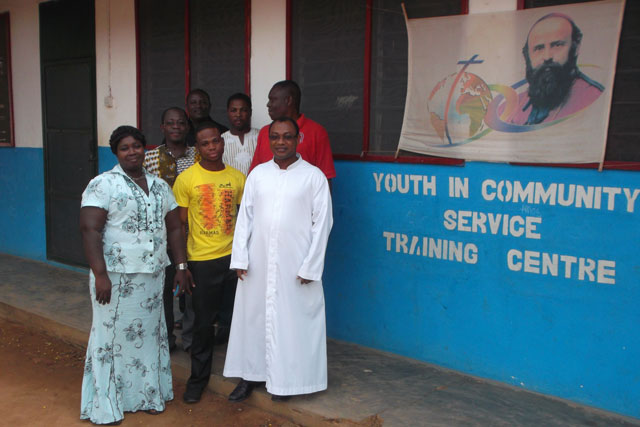 After the presentation, we moved on for some discussions. The minutes of the last meeting was read and few corrections made. From the matters arisen, we agreed to levy ourselves with an amount which can be paid from now up to the next second meeting. At last, we decided to have a recollection on the 14th March to redo ourselves in the Lenten Season. The meeting was then moved to closure with prayer and benediction. After this, we had an agape.
After the presentation, we moved on for some discussions. The minutes of the last meeting was read and few corrections made. From the matters arisen, we agreed to levy ourselves with an amount which can be paid from now up to the next second meeting. At last, we decided to have a recollection on the 14th March to redo ourselves in the Lenten Season. The meeting was then moved to closure with prayer and benediction. After this, we had an agape.



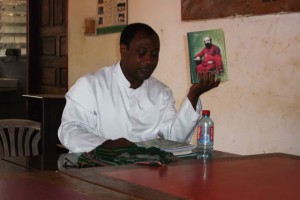
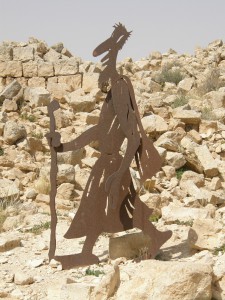

![Imagen%20101[1]](https://lmcomboni.org/blog/wp-content/uploads/2015/02/Imagen-1011-300x225.jpg)
